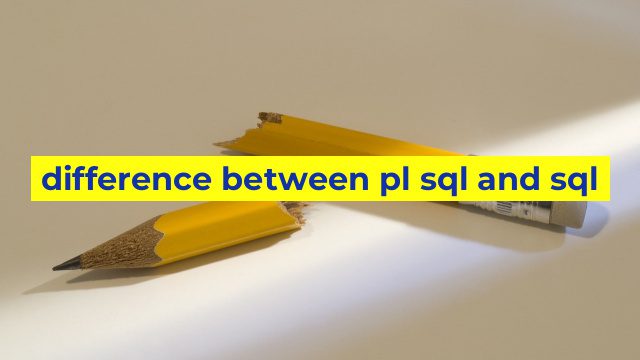Difference between PL/SQL and SQL
When it comes to working with databases, SQL and PL/SQL are two integral parts of the process. SQL (Structured Query Language) is a standard database language that is used to manage and manipulate data in relational databases. PL/SQL (Procedural Language/Structured Query Language) is a procedural language that extends SQL and provides several programming constructs, such as variables, loops, procedures, and functions, that allow for the development of robust applications.
What is SQL?
SQL is a standard database language that is used to manage and manipulate data stored in a relational database. SQL provides a set of commands that can be used to insert, update, delete, and retrieve data from a database. SQL is a declarative language, which means that you have to tell the database what you want to do, but not how to do it.
What is PL/SQL?
PL/SQL is a procedural language that is used to write programs that run inside an Oracle database. PL/SQL extends SQL and provides several programming constructs, such as variables, loops, procedures, and functions, that allow for the development of robust applications. PL/SQL programs are compiled and stored in the database, and can be executed from SQL*Plus or any front-end application.
Differences between PL/SQL and SQL
The following are some key differences between PL/SQL and SQL:
1. Purpose
SQL is primarily used to manage and manipulate data stored in a database, whereas PL/SQL is used to write programs that run inside an Oracle database.
2. Procedural Constructs
SQL is a declarative language and does not provide procedural constructs like variables, loops, and conditional statements. PL/SQL, on the other hand, is a full-fledged procedural language that provides all the programming constructs needed to write complex applications.
3. Accessing database objects
In SQL, you can perform operations on tables without using any programming constructs. In PL/SQL, however, you need to use programming constructs to interact with the database objects.
4. Portability
SQL is a standard language that is supported by most relational databases, whereas PL/SQL is specific to Oracle databases. This means that PL/SQL programs cannot be easily ported to other database platforms.
5. Data manipulation
In SQL, you can only manipulate data using SQL commands like INSERT, UPDATE, DELETE, and SELECT. In PL/SQL, however, you can use these commands as well as programming constructs to manipulate data.
Conclusion
In conclusion, SQL and PL/SQL are two integral parts of working with databases. While SQL is used to manage and manipulate data stored in a database, PL/SQL is used to write programs that run inside an Oracle database. The key differences between these languages lie in their purpose, procedural constructs, accessing database objects, portability, and data manipulation capabilities. It is important to understand these differences to determine which language to use for a given task.
Table difference between pl sql and sql
| PL/SQL | SQL |
|---|---|
| Procedural language used to create stored procedures, functions, packages, triggers, etc. | Declarative language used to manipulate and query data in databases. |
| Allows for programming constructs like loops, conditions, and exception handling. | Does not have programming constructs. |
| Can contain SQL statements as well as programming constructs. | Only contains SQL statements. |
| Used mainly in Oracle databases. | Used in various relational databases. |
| Designed to work with PL/SQL Developer tool. | No specific tool is required to work with SQL. |

